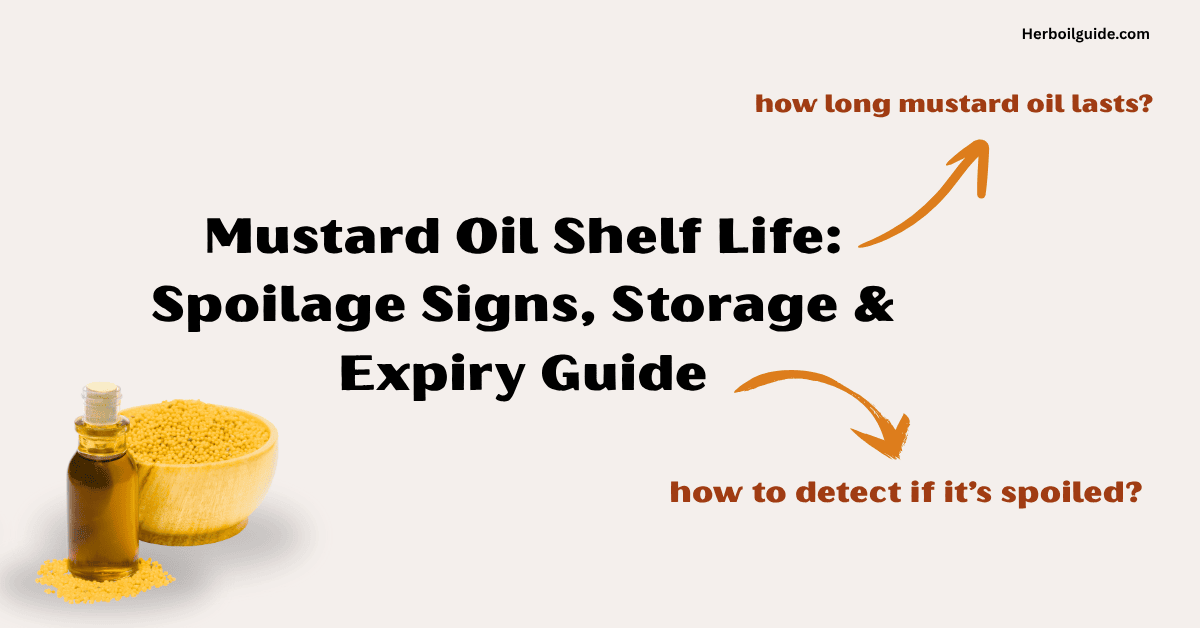Mustard Oil Shelf Life: Storage Tips, Spoilage Signs & Expiry Guide

Understanding the shelf life and spoilage indicators of mustard oil is essential for maintaining its nutritional integrity and ensuring safe usage. The chemical profile of mustard oil, including its natural antioxidants and fatty acids, determines how long it remains fresh. This guide covers how to identify spoilage and properly store mustard oil to maximize its longevity.
Table of Content
- 1. What Is the Shelf Life of Mustard Oil?
- 2. Factors That Influence Shelf Life
- 3. How to Identify Spoiled or Rancid Mustard Oil
- 4. Best Storage Practices to Extend Shelf Life
- 5. Shelf Life by Type of Mustard Oil
- 6. Can Expired Mustard Oil Be Used?
- 7. How Manufacturers Ensure Shelf Life
- 8. Scientific Research and Stats
- 9. Frequently Asked Questions (FAQs)
1. What Is the Shelf Life of Mustard Oil?
The shelf life of mustard oil varies based on its processing method, purity, and storage of mustard oil conditions. Proper storage in a cool, dark, airtight container significantly extends its freshness.
- Cold-Pressed Mustard Oil: Lasts up to 12–18 months when stored properly.
- Refined Mustard Oil: Can last up to 2 years, but often with reduced nutritional benefits.
- Mustard Essential Oil: Generally lasts over 2 years due to its purity from distillation.
2. Factors That Influence Shelf Life
Several factors affect mustard oil's stability:
- Extraction Method: Cold pressing preserves natural antioxidants that enhance longevity.
- Exposure to Light and Air: UV rays and oxygen cause oxidation and rancidity.
- Temperature: High temperatures accelerate the breakdown of fatty acids. Store below 25°C (77°F).
- Moisture Exposure: Can encourage microbial growth and spoilage.
3. How to Identify Spoiled or Rancid Mustard Oil
Detecting spoilage early prevents health risks. Look for common signs such as changes in color, an off-putting odor, or an unusual texture, which may also indicate adulteration.
a. Changes in Smell
Fresh mustard oil has a characteristically sharp, pungent aroma. If it smells sour, stale, soapy, or overly greasy, it has likely gone rancid.
b. Color Alteration
Pure, cold-pressed mustard oil ranges from golden yellow to a deep amber. Discoloration, cloudiness, or a faded appearance can signal oxidation.
c. Thickening or Separation
If the oil becomes unusually thick, sticky, or separates into layers, its molecular structure has started to break down.
d. Bitter or Off Taste
A fresh oil has a pungent flavor. A spoiled oil will taste sharp, metallic, or unpleasantly bitter.
4. Best Storage Practices to Extend Shelf Life
- Use Dark-Colored Glass Bottles: They block UV rays that degrade the oil.
- Keep Containers Airtight: A tight seal reduces oxygen exposure and prevents oxidation.
- Store in a Cool, Dry Place: A pantry or cabinet away from the stove or sunlight is ideal.
- Avoid Plastic Containers: Over time, chemicals from plastic can leach into the oil.
5. Shelf Life by Type of Mustard Oil
The types of mustard oil significantly impacts its shelf life. Cold-pressed varieties retain more natural preservatives, while refined oils are processed for stability.
| Type of Mustard Oil | Approx. Shelf Life | Special Considerations |
|---|---|---|
| Cold-Pressed (Kachi Ghani) | 12–18 months | Must be stored away from light & air. |
| Refined Mustard Oil | Up to 24 months | Longer life but fewer nutrients. |
| Mustard Essential Oil | Over 2 years | For external use only; very stable. |
6. Can Expired Mustard Oil Be Used?
Expired mustard oil should not be used for cooking due to health risks like digestive discomfort and increased oxidative stress. However, if it's only slightly past its expiry date and shows no signs of rancidity, it can be repurposed for non-edible uses like polishing metal, conditioning wood, or as lamp fuel.
7. How Manufacturers Ensure Shelf Life
Nitrogen Flushing: Displaces oxygen in packaging to slow
oxidation.
Use of Antioxidants: Natural tocopherols (Vitamin E) added
during bottling.
Batch Testing: Ensures that rancidity hasn’t set in before
reaching consumers.
Adding tocopherols and nitrogen flushing (attributes) during
bottling (process) helps mustard oil retain quality longer
(value).
8. Scientific Research and Stats
A study published in the International Journal of Food Science
(2021) found that mustard oil stored at 20°C in opaque glass
retained over 90% of its antioxidants after 12 months. (Source)
Another study from Statista revealed that 68% of Indian
consumers prefer cold-pressed oils for shelf life and health
benefits. (Source)
9. Frequently Asked Questions (FAQs)
Q1: What is the shelf life of mustard oil once opened?
A1: If stored properly in a cool, dark place with the cap sealed tightly, an opened bottle of cold-pressed mustard oil can last up to 12 months.
Q2: Can you use mustard oil after the expiry date?
A2: It’s not recommended for consumption. For external use, check for any signs of spoilage like a bad smell or changed texture before using.
Q3: Does refrigeration extend mustard oil's life?
A3: While not necessary, refrigerating mustard oil can slow oxidation, especially in hot climates. The oil may become cloudy but will return to normal at room temperature.
Q4: Why does mustard oil smell different over time?
A4: Changes in aroma are typically due to oxidative changes from prolonged exposure to air and light, which alters the oil's chemical compounds.
Q5: Can rancid mustard oil cause health problems?
A5: Yes. Spoiled oil can contribute to digestive issues, inflammation, and increased free radicals in the body.